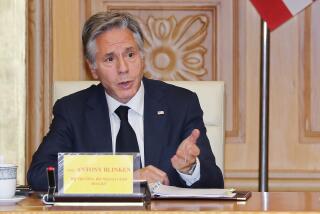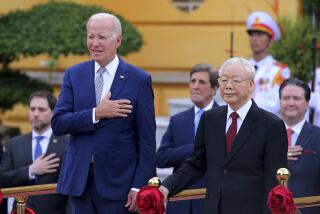Clinton Decides to Lift Curbs on Hanoi, Aides Say
- Share via
WASHINGTON — President Clinton has decided to lift the 19-year-old trade embargo against Vietnam and could announce the move before the end of the week, according to Administration officials.
The decision, which would mark a historic reconciliation step, follows a formal recommendation by Secretary of State Warren Christopher late last week after lengthy deliberations by the Administration over the highly emotional issue. The White House is expected to attach no conditions to ending the trade ban, officials said.
The formal signing ceremony will be delayed to give the Administration time to follow usual procedures and notify members of Congress of its plans. The President has sole authority to take the action, which will be accomplished through an executive order.
The embargo, which has prohibited all trade with Vietnam since the Vietnam War ended in 1975, has been relaxed slightly in recent months to permit some businesses to begin making contacts in the Southeast Asian country. Among those pressing for the move has been the Vietnamese government, which has been eager for the economic stimulus that trade with the United States would bring.
But word of the decision brought an angry reaction from Congress’ chief opponent of normalization, Sen. Robert C. Smith (R-N.H.), who has argued, along with some veterans group and family organizations, that Vietnam has not done enough to account for missing servicemen left behind in Vietnam after the war. Smith and his allies had hoped that the Administration would continue to enforce the embargo as a way to pressure the Vietnamese into doing more to account for missing American servicemen.
“I’m disappointed, I’m angry and I’m sad. But there’s nothing we can do now. It’s over,” Smith said. He said that the decision appears to be “a done deal.”
The American Legion, the National League of Families and other veterans and family groups have objected strongly to removal of the embargo. They have continued to lobby the White House against the move, and some representatives of the groups met as recently as last week with National Security Adviser Anthony Lake.
But intense pressure for a resumption of trade came from American businesses, including California concerns that saw the potential rewards of trade ties to a nation that has long sought them. And other Americans--including some veterans--have been eager for the United States to finally heal the last wounds of a war that divided Americans.
Only last week, the Senate voted 62 to 38 in a non-binding resolution that the United States should end the embargo “as expeditiously” as possible. By providing some political cover, that lopsided vote made it easier for Clinton to make a decision that the Administration had long leaned toward.
Yet because it will enrage some veterans, lifting the embargo will still be politically difficult for Clinton: Like many others of his generation, he avoided the military draft.
About 2,200 Americans are still listed as missing from the war, but officials have said that there are no more than a few dozen unresolved cases.
Sen. John F. Kerry (D-Mass.), a leading proponent of normal relations with Vietnam and a veteran of the war, had not heard of the decision, a spokesperson said. Kerry and Sen. John McCain (R-Ariz.), who was a prisoner of war during the conflict, sought last week’s vote as a means of encouraging Clinton to lift the embargo.
U.S. officials have made two special trips to Vietnam to discuss the issue, but their growing agreement in favor of ending the ban has been hinted at for some time.
One such hint came when Pentagon officials declared unreliable Russian documents purporting to show that Hanoi had held about twice as many U.S. soldiers as the 575 released at the end of the war. The Pentagon said its analysis showed that the documents contained many “exaggerations and fabrications.”
Washington imposed a trade embargo against North Vietnam in 1964.
More to Read
Get the L.A. Times Politics newsletter
Deeply reported insights into legislation, politics and policy from Sacramento, Washington and beyond. In your inbox three times per week.
You may occasionally receive promotional content from the Los Angeles Times.












